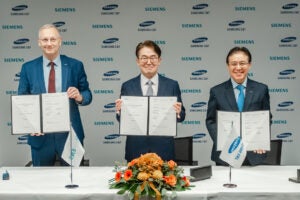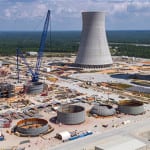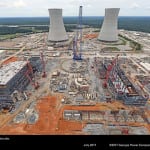The Georgia Public Service Commission on December 11 said it will decide December 21 whether to allow construction of two new nuclear reactors at the Plant Vogtle site to move forward, or call for the project to be canceled.
Commissioners voted Monday to move up the timetable for a decision on the troubled nuclear project after noting that Georgia Power CEO Paul Bowers said his company would pass through $150 million in tax savings to ratepayers, if the project is canceled by year-end. The move came on the first of four days of hearings in Atlanta, Georgia, to determine the next steps for the PSC and Georgia Power with regard to the oft-delayed construction of two new AP1000 reactors at the nuclear plant near Waynesboro, Georgia.
This week’s hearings had been expected to pave the way for a PSC decision on the project’s fate, a decision originally scheduled for February 2018. POWER magazine has been among those reporting that pending changes to the federal corporate tax rate structure under consideration by Congress could accelerate that timetable.
PSC chairman Stan Wise on December 1 asked Georgia Power, the project’s lead utility, about how changes in corporate tax law could affect the project. Bowers on December 6 responded that a change in the U.S. corporate tax rate from 35% to 20% would provide economic impetus for the utility to make a decision by year-end, particularly if the decision is to abandon the project.
Bowers, in his response letter to the PSC last week, said: “If the decision were to be made that it is in the best interest of customers to cease the construction of Plant Vogtle Units 3 & 4, making that determination prior to December 31, 2017 would preserve the Company’s ability to utilize the current higher federal tax rate under what is known in simple accounting terms as an abandonment deduction.” Bowers in the letter said an abandonment declaration prior to year-end would enable Georgia Power “to realize an approximately $150 million larger tax benefit under the current 35 percent tax rate. These benefits would offset project costs and be passed along to customers through the traditional ratemaking process.”
PSC staff on Monday heard from both supporters and opponents of the Vogtle project. Supporters have said the two-unit expansion at Vogtle is the country’s best opportunity to further the next generation of U.S. nuclear power and generate carbon-free electricity. Opponents point to billions of dollars in cost overruns for the project, and claim Vogtle would continue to lose money as natural gas and renewable sources of energy continue to take a larger share of the nation’s power generation.
The PSC’s Tom Newsome, director of utility finance for the commission, was among those noting the possibility of continued financial losses. He said more delays beyond those projected by Georgia Power and it project partners could make the expansion an even worse deal, by as much as $4.9 billion, noting more delays would have “a significant adverse impact” on costs. He said that with continued construction, only $9 billion of the cost should be considered “reasonable” and borne by ratepayers; any additional costs “should be absorbed by the company.”
Dr. William Jacobs, a consultant to the PSC, under questioning from Georgia Power attorney Kevin Greene said current cost and schedule projections might be considered “reasonable,” but noted the “large amount of uncertainty” that still surrounds the project and its ultimate completion. Other PSC staff pointed out that China, about two years ahead of the Vogtle project in building new AP1000 reactors, still has not put one into commercial operation. Jacobs, along with Steven Roetger, an analyst for the PSC, referenced the continued difficulties with construction. Said Roetger: “I can only imagine the frustration” of those companies working on the project.
“A lot of time was wasted getting little work done,” Roetger said. “We’ve been at this for many years and we still have a long way to go.”
Global engineering management company Bechtel is leading current construction under the direction of Southern Nuclear, part of Southern Co., the parent of Georgia Power. If the project moves forward, Unit 3 at Vogtle is expected to come online in November 2021, with Unit 4 startup scheduled for November 2022. The oft-delayed project was first approved in 2009 and originally scheduled for startup in 2016.
The original lead contractor, Westinghouse, filed for bankruptcy in March 2017, citing cost overruns from both Vogtle and a similar nuclear expansion project at the V.C. Summer Plant in South Carolina. The Vogtle project is the only large-scale nuclear construction underway in the U.S. after the Summer expansion was canceled earlier this year.
—Darrell Proctor is a POWER associate editor (@DarrellProctor1, @POWERmagazine)









